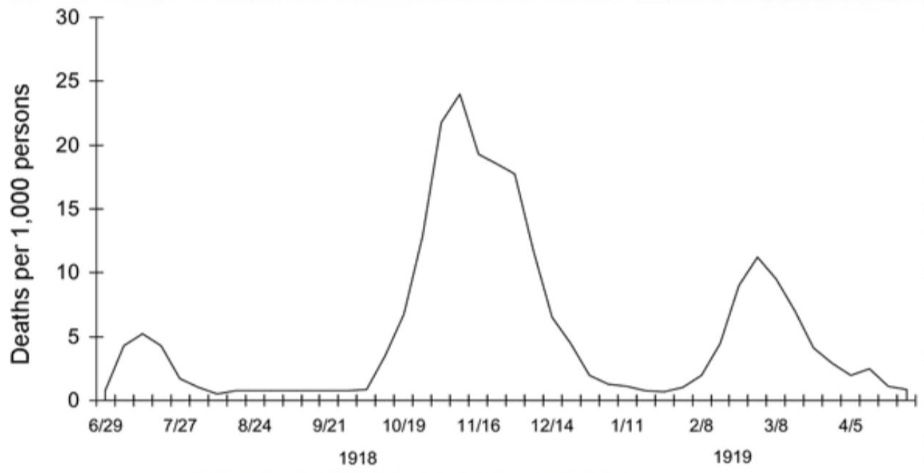Emerging Hotspots
-
I for one have the impression that no second wave is coming.
We've relaxed restrictions quite a bit in the last weeks. They've been relaxed long enough to have a visible effect. Also, the lack of restrictions have lead to a factual change in behavior, so one cannot argue that people still act as if the restrictions were still in place. One would expect infection rates to go up again. But they don't. Why?
-
@jon-nyc said in Emerging Hotspots:
Well the obvious answers would be ‘it’s to early to tell’.
Why? I think the comparison to the 1918 flu is meaningless. Those waves emerged due to mutations of the virus. But the wave we are speculating about is about the same virus but with relaxed lockdown measures. Analytically, it should only take a very small number of weeks to see effects.
-
The point wasn’t ‘this will be just like the 1918 flu’, rather just that lags between waves are common.
I suppose it’s possible that remaining distancing measures and maybe some seasonality allows the virus to die out altogether. That would be awesome, though it seems a little too much to hope for at this point.
-
https://www.politico.com/news/2020/05/28/rising-icu-bed-use-red-flag-287552
Intensive care units in Montgomery, Ala., are overflowing with Covid-19 patients, pushing them into emergency departments that are not primed to care for them. And Alabama’s capital city could be a harbinger for other parts of the country.
ICU beds are also starting to fill up in places like Minnesota’s Twin Cities; Omaha, Neb.; and the entire state of Rhode Island, according to local health officials and epidemiologists tracking such data, a warning sign of possible health care problems down the road. The availability of ICU beds is one measure of a hospital’s ability to care for its most vulnerable patients — people with severe illness who require more staff to treat them and may need life-support equipment such as a ventilator to breathe. And it's served as a metric for whether the local health care system is able to handle a coronavirus outbreak, albeit a constantly shifting one.
Some state leaders deny there are problems, saying they are prepared to convert regular hospital beds to ICU beds, if necessary. In the meantime, they are pressing ahead with reopening plans.
But Paul Biddinger, director of Harvard's School of Public Health Emergency Preparedness Research, Evaluation and Practice Program, says it's “a big red flag that when you see increasing numbers of ICU patients with Covid.”
“Our greatest fear about not being able to blunt the peak of illness, not being able to flatten the curve, is that ... people will be exposed to the virus, become ill and potentially die because too many people became sick too quickly and it overwhelmed the health care system," Biddinger tells POLITICO.
-
Is anyone surprised?
https://thehill.com/policy/healthcare/499798-health-officials-nervously-eye-emerging-hotspots
Public health officials are nervously eyeing cities that may become the next epicenters of the coronavirus pandemic as new models point to increased rates of transmission.
The fact that restless Americans are now emerging from lockdowns to resume something approximating normal life is only exacerbating those concerns.
While the number of new coronavirus cases is declining in New York, Seattle and other focal points of the first wave of cases, models are predicting that cases could skyrocket in the next two weeks in cities like Houston, Dallas, Nashville, Tenn., and Memphis, Tenn., creating new epicenters.
ADVERTISEMENT
Modelers are also watching suburban areas like Fairfax County in Virginia, and areas around Minneapolis, Phoenix and Omaha, Neb.“We think there's a storm out there, there's the potential for a storm. We're not sure if it's going to land on shore,” said David Rubin, director of the PolicyLab at the Children's Hospital of Philadelphia, whose models show the impending surges. “The next two to three weeks are going to be really important.”
Epidemiologists were alarmed over the Memorial Day weekend when big crowds showed up to stroll the boardwalk in Ocean City, Md., and when viral videos showed raucous pool parties at Lake of the Ozarks in Missouri. The social distancing habits that have had a measurable impact curbing the spread of the virus seemed to have been abandoned by tourists and partiers ready to let their guard down after two months of enforced lockdowns.
To public health experts, those large gatherings, with nary a mask in sight, have lit a fuse, but they say it will take a week or two to understand just how deadly a blast it ignites.
@George-K said in Emerging Hotspots:
Epidemiologists were alarmed over the Memorial Day weekend when ... viral videos showed raucous pool parties at Lake of the Ozarks in Missouri..
-
I'm watching the riots in several cities this evening.
These people are not practicing social distancing.
Good thing the pandemic is over, otherwise this could be a catalyst to that exponential growth of the virus in urban areas.Whew! That was a close one.
-
I'm watching the riots in several cities this evening.
These people are not practicing social distancing.
Good thing the pandemic is over, otherwise this could be a catalyst to that exponential growth of the virus in urban areas.Whew! That was a close one.
@Rainman said in Emerging Hotspots:
I'm watching the riots in several cities this evening.
These people are not practicing social distancing.
Good thing the pandemic is over, otherwise this could be a catalyst to that exponential growth of the virus in urban areas.Whew! That was a close one.
Yeah, but many of them were wearing masks...

